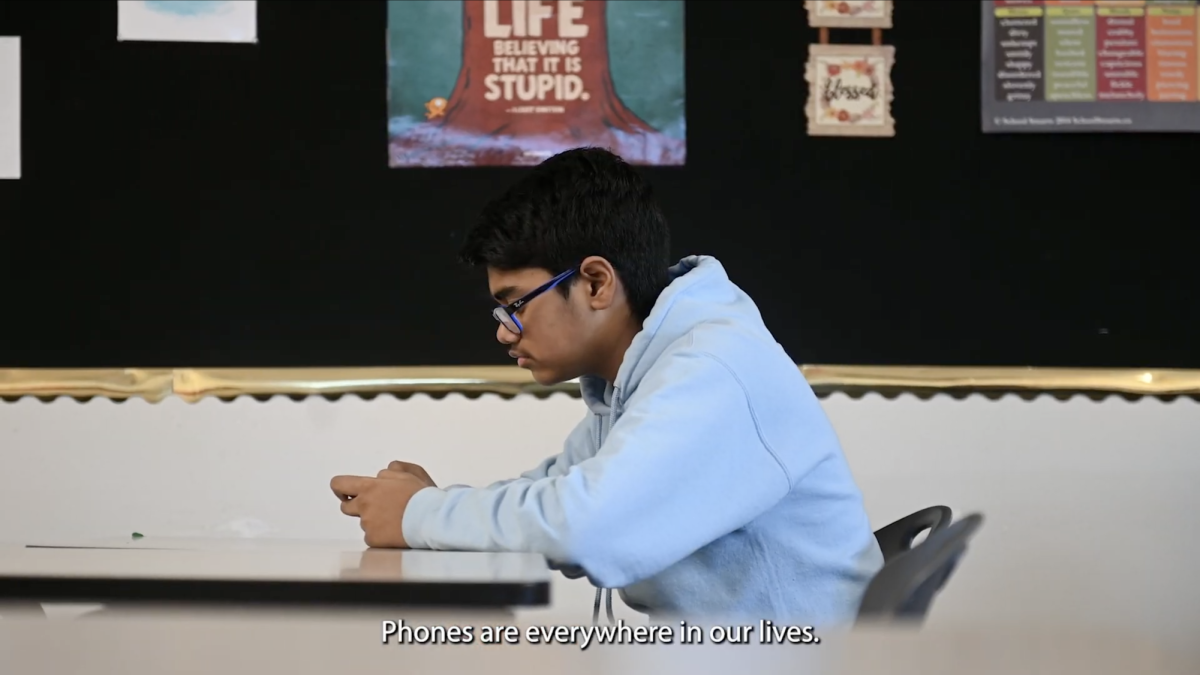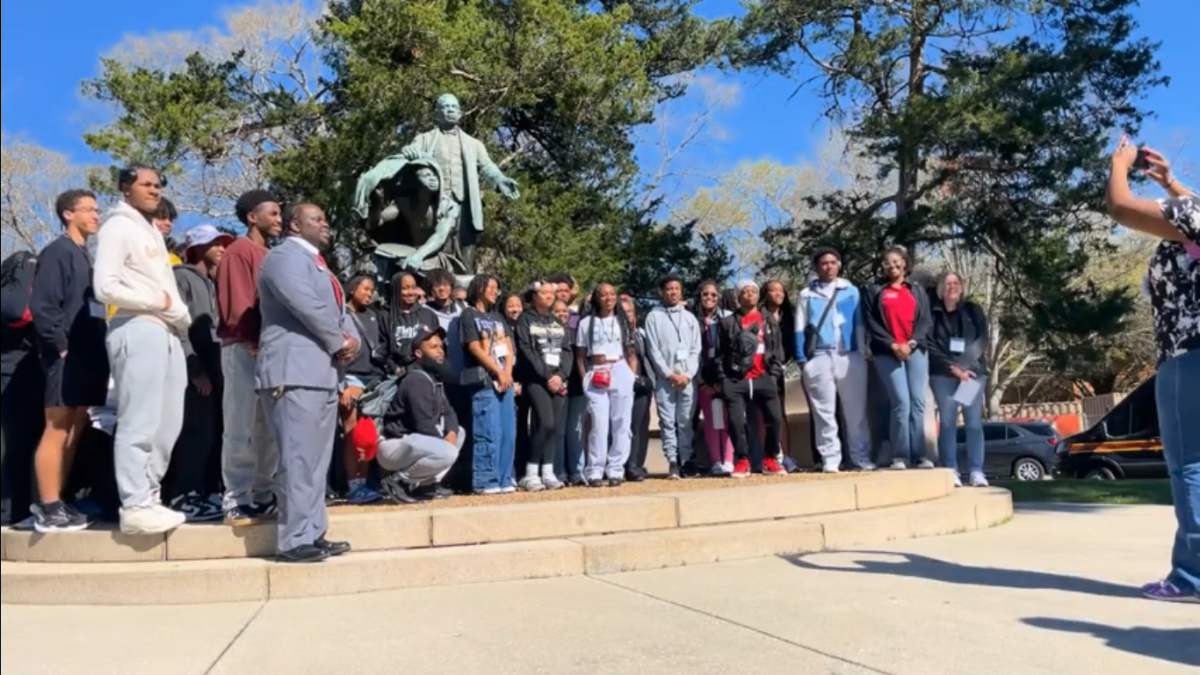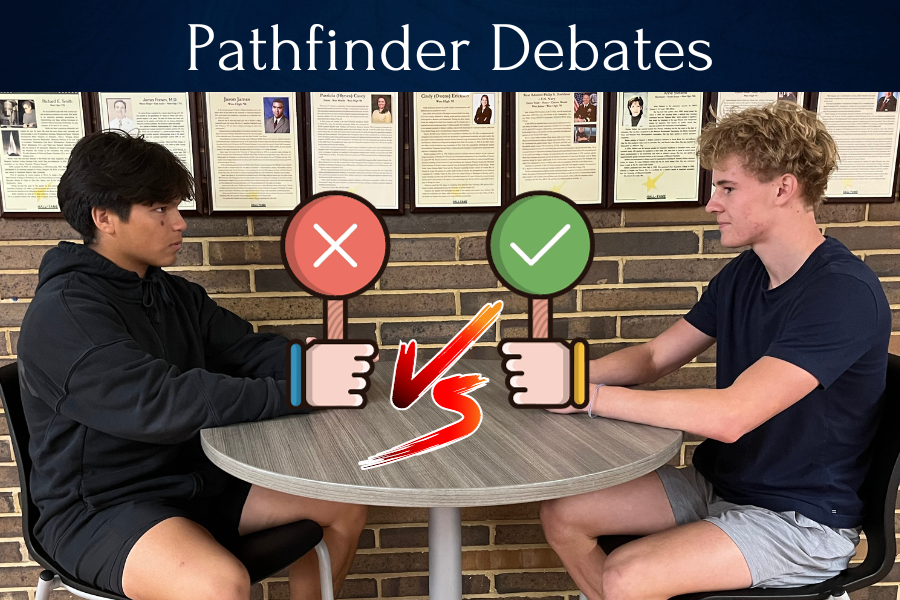Senior Raj Jaladi: Welcome to another episode of Pathfinder Debates, a series where we gather two different opposing views in a political debate. I’m Raj Jaladi, a senior here at Parkway West High, joined by…
Senior Michael Emerson: Michael Emerson, I’m a senior.
Junior Will Gonsior: I’m Will Gonsior. I’m a junior.
Jaladi: Let’s just start off. Broadly, when people talk about immigration, what’s your overall stance? If you could describe it a little bit, and then we’ll go more into depth based on that. We’ll start off with Michael.
Emerson: I mean, so overall, I think immigration can be a good thing, but we want immigrants to contribute to American society. So, we have to be selective about who can and can’t become a US citizen.
Gonsior: I’m very [much] in favor of letting people come to America legally, and letting more people come to America legally, both for their own benefit and also to fill and create more jobs.
Jaladi: So, you mentioned there, “legally.” So, let’s talk about it and start there. So, obviously, we do have several undocumented immigrants in our country today. What is your belief on what we should do with undocumented immigrants and so forth?
Emerson: I would say that, if it’s possible to enforce, I would say a path to residency, because, like undocumented immigrants, well, it’s illegal. And obviously, it’s a lot easier, it’s probably easier to get into the country illegally than legally in many cases. You can’t just give them citizenship because that essentially reinforces the idea that it’s fine to do something not legal. But if you give them a path to residency, especially if they’re somebody that has proven that they can contribute to American society, then we still get the good parts of their contributions, and we also get to tax them. But we don’t have to worry about having to spend a lot of money or resources on them.
Gonsior: If someone has a job or is doing any sort of work here in the United States, then it’s going to hurt the economy if you’re going to deport them. I think deportation is a waste of resources, and a lot of the agents who work on something like catching the port
would be better served checking for human smuggling or drug smuggling at the border. So, I would say I absolutely support a path to citizenship for people who are in the country.
If they’re already here, you might as well process them, might as well have the government actually know that they’re here. [It] makes things easier.
Emerson: So, how would you discourage illegal immigration?
Gonsior: I think the best way to discourage illegal immigration is to make it much easier to come to America legally. When it’s pretty simple to come to America legally, you know that the people who do try to come illegally are probably not up to any good.
Emerson: That makes sense. But there’s also, I feel like, there’s more people that want to become American citizens than we really need. Especially like unskilled laborers, with ChatGPT and other AI replacing the need for those jobs, I feel like we still, there still would be a lot of people that not necessarily are trying to smuggle drugs or anything like that, that still are trying to cross the border illegally.
Gonsior: Something that might work for that is changing our approach to how the government spends money to where, instead of focusing on more welfare-based services, we would focus on enriching the infrastructure of the country, in housing, in medicine and health care, in transportation, therefore, making it so that America is able to support more people instead of focusing on more payout focusing.
Emerson: Yeah, that makes sense. The only thing that I would say would make that a challenge is that the national debt as it is right now, is already so high that like, it seems we already need budget cuts and the government to resolve that except I just feel that adding more immigrants, especially unskilled immigrants, will increase the debt and make things go in the wrong direction.
Gonsior: I would say it would need to be a reallocation instead of adding new funding. But I know Social Security is useful, and Medicaid and [those] sort of things are useful. But I question whether it’s the absolute best way we could be spending all that money, you know?
Emerson: Yeah, and I completely agree. It’s just, the issue is, how do you get rid of those programs that people have been paying for so long? So, I don’t know if it’s 60 or 65 years. But if you get rid of Social Security, just at any given point in time, it’s going to make the people that are close to that point, extremely upset.
Jaladi: Well, I have a question for you, Will. So obviously, you were saying that we should allow most people who want to be immigrants an easier way to come into the country. I know off my personal experience that a lot of, I say a lot of because of the country’s population is so big from India, especially, I would say hundreds of millions of people wanting to come to this country. How would you want to regulate that? Because there the demand is very, very high,
Gonsior: I suppose I hadn’t really considered that if you make it a lot easier, then suddenly, you’re going to get higher demand than there is right now, to the point where you could be overwhelmed, but I think at a certain point once you get to a reasonable carrying capacity, people are going to stop wanting to come, and it’s just about having that free movement of labor. I think the fact that we are living in a capitalist world can kind of solve that on its own, people are going to go where they can find work.
Emerson: My issue with that is that I don’t like, especially for the current Americans,
if we reach that carrying capacity, then that means that they’re going to have a harder time finding jobs, and it’s just going to be a worse living situation for them, in general. Because if the demand decreases, that would just be likely due to the fact that living conditions have declined in America, at least for immigrants.
Gonsior: But I think you’re right. I think this could potentially at least decrease the amount of bargaining power that American workers have. You would need to restructure some other things related to maybe some revised tax codes to make sure that the tax burden is placed on
employers instead of employees because this would probably be something that would benefit the ‘one percent’ more than it would benefit workers. But, I also think that just because you’re living in America right now doesn’t mean you’re necessarily entitled to having more than everybody else, or that the government necessarily has a responsibility to protect your life first.
Emerson: Yeah, I guess that’s where I would probably say I disagree, but, that’s more of a moral debate.
Jaladi: Well, let’s transition a little bit. There’s a lot of discussion going on right now about this. But let’s talk about the southern border. So obviously, there are a lot of issues stemming from the southern border, like I’m working with the fentanyl workgroup in Parkway. And obviously, the southern border has been the source of a lot of illegal fentanyl flowing through into the United States. So, how can we regulate that? How would you regulate that? And how would we also regulate a lot of illegal immigration that’s occurring through the southern border right now as well?
Emerson: I mean, I’m pretty sure we can both agree that fentanyl smuggling is not ideal for America. But, it’s tough because I honestly don’t think a wall is going to do all that much, especially when you can just use a boat. But, I would just say the best way is harsher punishments for smuggling because I don’t think there’s much else you can really do.
Gonsior: Over the Trump presidency, the border agents stopped focusing quite as much of their resources on stopping smuggling rings and human trafficking rings and started putting more resources towards stopping any illegal immigration. And I think that trend needs to reverse where the No. 1 priority for border agents is going to be anything that’s getting traffic illegally, whether that’s human trafficking, whether that’s fentanyl and focusing not so much on stopping people from coming in but on stopping criminals or like criminal rings from getting into the country or stopping drugs from getting into the country.
Emerson: So, I think that’s probably a lot more difficult than it seems just because a lot of the ways the legal immigrants cross the border is thanks to the cartel. And that, they would have to do something for the cartel; for example, it could be a family, smuggling drugs. I don’t really have any facts or statistics on this, but I’ve read that families often have to either smuggle drugs or just do something for the cartels to get over the border. So I don’t really know how you’d be able to separate punishing illegal immigrants from the cartel because you can’t really differentiate who’s with who.
Gonsior: That’s fair, but I think that difference was beforehand, they would actually be going after rings that were participating in a lot of smuggling, versus just trying to keep everyone out, and maybe that doesn’t result in much of a difference. But, I also think that legal processing of people into the country is a very good way to make sure that they don’t have anything, at least with them when they’re crossing. So, if more of the people who are crossing illegally are shifted over to being people who are legally going into the country, then it becomes easier to use the resources that you have to fight whatever is coming over the border that isn’t legally doing so.
Jaladi: So obviously, there have been discussions about preserving culture versus having a “national identity.” So, I’m curious what you think about assimilation versus preserving culture with immigrants as we have immigrants from all around the world coming to America, Michael.
Emerson; I think assimilation is necessary because we can’t have it except it’s only to agree to a degree because I feel like cultural traditions and practicing one’s own religion is completely fine. But I also don’t want a ton of people that, for example, believe that Chinese Communist Party is the best way to run the government because that would just completely change America from its ideals.
Gonsior: I’m contemplating how classist I want to sound right now. If you look at the demographics, a lot of the people who want to come to this country are Catholic, much more so than the rest of the country is, and I’m not sure what that would look like elsewhere. That aligns very well with the traditional values of this country, and I feel like to a certain extent, that might almost be something that we’ve gotten away from that it would be useful to go back to.
Jaladi: Do you think there should be more of a value on merit-based immigration, or family-based immigration?
Emerson: If there’s somebody really, really smart or that can contribute to American society, I feel we should allow their entire family to immigrate. It would be family-based immigration, [in] that sense. Although I would say that the No. 1 priority should be merit, like how much they can contribute to the American economy and society,
Jaladi: How do we determine merit?
Emerson: That is the issue because there’s not a standardized test that measures how well you can perform in American society. I would say like, for example, work visas, you could just make the full citizenship. Or, if they already have some contract with an American employer that guarantees them to have a job to work in the American economy to pay taxes as well, then they would be like a priority immigrant.
Gonsior: I think it’s reasonable to focus first on bringing in just the immediate families of people who are American citizens, but after that, if there are going to be immigration quotas, I think headhunting is a pretty decent idea, like target people who are college educated, target people who can help the American economy in being able to support the healthcare needs of people. Those people who have their talent should be able to use it, and that kind of helps the global power of America.
Emerson: And I agree with you that I meant by “families,” immediate families. So, like 50 cousins would be a little bit too far, especially if we still have the quotas, which I think are necessary because we don’t want to have an overflow of immigrants that our infrastructure can’t handle.
Jaladi: Alright, let’s go to my next point. So obviously, if we do have a lot of immigrants from different countries who are very skilled, we can potentially see a problem with those countries, from which the immigrants are coming. They call it a brain drain or a loss of talent or loss of skill because all the skilled laborers are going to another country. How or what can we do to combat that? What do you think about that as well?
Emerson: I mean, selfishly, I don’t really care. I prioritize American needs over the needs of any other country. So, obviously, we could send help if we have extra resources. But, if they voluntarily choose to come to America, why should we have to pay some sort of reparations to the country we got the person from?
Gonsior: I think that when you’re talking about the very most talented individuals that, you know, [in a] free market society, they should be allowed to go and secure the bag. And also, when we can take some of the population burden off countries that would otherwise be suffering from brain drain because the United States is a country that doesn’t fully reproduce its population, whereas most countries, at least on their own, have growing populations, it tends to also be useful in that way. We wouldn’t want to overspread it and be taking away the entire medical infrastructure of another country or something like that over here. But if it’s like targeted immigration of very talented individuals, I would still support that.
Emerson: Yeah, and I guess now that you brought up the medical, we can’t really wipe out people’s medical infrastructure. I feel like in the case of recruiting doctors, that may be some[thing] that we could teach other countries American forms of medicine, as sort of a way to pay them back for their employee that’s living in America for the rest of their lives.
Gonsior: That’s actually a decent idea. Most countries tend to know what Western medicine is and have schools that teach it. But if we were to start investing as America, I guess we do have public universities that can not be a waste of money, investing in schools abroad that could produce doctors for a country and then, like the very cream of the crop, send them over to America, that could be an interesting model.
Jaladi: Thank you for listening to another episode of the Pathfinder Debates. Stay tuned for more in the future.




![Standing in front of the camera and next to Fox 2 News' Ty Hawkins, senior and varsity football player JaMont Brooks represents the varsity football team. As captain and outside linebacker, Brooks was one of four students selected to be interviewed live for the broadcast. “Overall, it was just a crazy experience being on the news. Even when I get older, I’ll tell my kids or grandkids I was on the news. My mom sent me a picture of me on the news [saying] ‘Oh my gosh, that’s my son.’ The Parkway West community felt amazing this morning. Everybody showed up at 6 [a.m.] and [will] show up 6 [p.m.] tonight too. Any time I go into a game, I go up there with the mentality that we’re going to try our best, and even the times we struggle, [I’ll] keep my head up,” Brooks said.](https://pwestpathfinder.com/wp-content/uploads/2025/10/DSC8122-Enhanced-NR-1200x799.jpg)

![Blue lights shining brightly, senior Riley Creely beatboxes into the microphone. Creely and the group began the performance in front of the blue lights, sparking interest from the audience. “The pep rally performance was fun. I got to beatbox for the first half of the song, which was hype. I liked to look into the student section [while I performed],” Creely said.](https://pwestpathfinder.com/wp-content/uploads/2025/09/DSC_5085-Enhanced-NR-1200x799.jpg)

![Leaping through the air, senior Tyler Watts celebrates his first goal of the season, which put the Longhorns up 1-0 against the Lafayette Lancers. Watts decided to play soccer for West for his last year of high school and secured a spot on the varsity roster. “[Playing soccer for West] is something I had always dreamed of, but hadn’t really had a good opportunity to do until now. It’s [really] fun being out [on the field], and I’m glad I decided to join the team. It’s just all about having fun with the boys and enjoying what time we have left together,” Watts said.](https://pwestpathfinder.com/wp-content/uploads/2025/09/DSC_1951-1200x855.jpg)
![Sophomore Natalie House pitches the ball during an intrasquad scrimmage for Red and Blue Night on Aug. 22. House played catcher for the varsity softball team. “I started [playing] softball when I was five. My brother played baseball, and I wanted to start sports like him. Scrimmaging against our own team is always kind of difficult because we all know each other's [weaknesses],” House said.](https://pwestpathfinder.com/wp-content/uploads/2025/09/DSC7191-1-1-1200x844.jpg)

![Blending harmonies with dynamic control, senior Spencer Rahm takes the stage as part of the jazz choir's spring performance. Jazz Coffee House took place on April 22, marking the culmination of months of preparation by West High’s musicians. “To me, [choir] is an opportunity every day to get to sing with my friends and work on our songs that we have concerts for. [Seeing] the results after working together with people is really rewarding. Jazz Coffee House concert was a reflection and a result of all the hard work we've put in the last three months,” Rahm said.](https://pwestpathfinder.com/wp-content/uploads/2025/05/DSC_0214-3-1200x800.jpg)







![In perfect shooting form and with eyes on the rim, junior Tyler Kuehl is about to shoot his next basket in the last game of the season against Marquette High School. Kuehl has been playing basketball since he was 5. “Even though I played basketball all my life, the game-winning shots can be pressure, it's confidence. If you're going into that shot and not thinking that you're gonna make it, it's obviously not going in. And if you believe, [it will]. That's the only way you can succeed,” Kuehl said.](https://pwestpathfinder.com/wp-content/uploads/2024/01/unnamed-32-1-1200x1200.png)




![Smiling in a sea of Longhorns, Fox 2 reporter Ty Hawkins joins junior Darren Young during the morning Oct. 3 pep rally. The last time West was featured in this segment was 2011. “[I hope people see this and think] if you come to [Parkway] West, you will have the time of your life because there are so many fun activities to do that make it feel like you belong here. I was surprised so many people attended, but it was a lot of fun,” Young said.](https://pwestpathfinder.com/wp-content/uploads/2025/10/Edited2-1200x798.jpg)


![Hugging senior Ella Wheeler, senior Jamaya Love beams after scoring a touchdown at the Powderpuff football game on Sept. 11, putting the seniors on the scoreboard with a score of 6-2 above the juniors. The seniors went on to capture the victory with a final score of 12-2. “I was actually gassed [at this moment]. I was so tired. But, everyone on the sideline, all my teammates and everybody in the stands were cheering,” Love said.](https://pwestpathfinder.com/wp-content/uploads/2025/09/DSC1735-Enhanced-NR-2-1200x799.jpg)
![Raising her hands in the air, freshman Jillian Sternhagen follows Mr. Mooney’s lead during an activity Aug. 15 at freshman orientation. Surrounded by other freshmen, Sternhagen learned an “A O E day” chant to help remember their new weekly high school schedule. Students participated in several activities to get to know each other, the school and the upperclassmen. “We got to tour the school and learn where everything in our schedule is. The energy [at orientation] was fun; the leaders were peppy and got us excited,” Sternhagen said.](https://pwestpathfinder.com/wp-content/uploads/2025/08/DSC_0145-1200x798.jpg)
![Shifting global trade, President Donald Trump’s tariffs are raising concerns about economic stability for the U.S. and other countries alike. “[The tariffs are] going to pose a distinct challenge to the U.S. economy and a challenge to the global economy on the whole because it's going to greatly upset who trades with who and where resources and products are going to come from,” social studies teacher Melvin Trotier said.](https://pwestpathfinder.com/wp-content/uploads/2025/05/MDB_3456-1200x800.jpg)

![“I started playing [basketball] because I saw that my brothers were playing, and I found it fun; I started playing at age eight and have continued to play ever since. [Something] I enjoy [is] the back-and-forth competitiveness of basketball that I don't get when I play softball, as well as our team bonding activities because I think it helps with the chemistry throughout our group and in the real world. I also enjoy winning and all of the competitive aspects. [Basketball] has brought great memories and people into my life, and I enjoy spending most of my time with them and cherish the memories my team has created. Getting to go out and play with my very best friends every day is just the best gift a girl can get. A big thing that motivates me is how much time and effort my coaches put in. I just want to work hard because they work hard, while also making my parents proud at the same time. Sometimes, it’s not an easy task being able to balance school and athletics, but with the right mindset and focusing on the goals that I have set for myself, it’s achievable. In high-pressure situations, I just go back to playing my own game [and the basics within the game] rather than focusing on everything around me because I trust my training and my practice. [My advice for upcoming players] is to keep going and continue to practice. Nobody is perfect, there is always going to be something to improve or get better at. There is always going to be someone out there who is doing better than you, and if you want to be the best, you have to keep going and push yourself to be better, but most importantly just have fun in what you’re doing.” - Siena Snyder, 12](https://pwestpathfinder.com/wp-content/uploads/2025/03/DSC0571-Enhanced-NR-Ella-McNeal-1-1-1200x798.jpg)
![“[I think being a teacher comes] from a place of experience, where we all enjoyed high school. It had a meaningful impact on us, which was [the case] for me. I had a lot of good mentors in high school, and seeing the opportunity, the impact that they could make, I think [that was] what inspired me. [It] definitely goes back to one teacher in particular [that] I had in eighth grade, he was a huge role model for me, and somebody who I was so appreciative of what he did for me. I figured if I could do even a fraction of what he did I feel like I would be very fulfilled [in] myself, and so there's just that aspect of wanting to do something meaningful every day.” - Kaleb Schumer, English](https://pwestpathfinder.com/wp-content/uploads/2024/12/IMG_9428-1200x800.jpeg)
